Introduction
- Abrahamic religions:
- Christianity, Judaism, and Islam.
- Eastern Religions:
- Hinduism, Buddhism, Confucianism, and Taoism.
Abrahamic religions include Christianity, Judaism, and Islam. Abrahamic religions originated from the Middle East. Abraham is the common ancestor of these religions. Judaism is the oldest Abrahamic religion. On the other hand, Islam is the newest Abrahamic religion. The followers of the Abrahamic religion account for almost half of the population of the world. Members of the Abrahamic religions are mainly in the Middle East, Europe, North America, and South America.
Eastern religions include Hinduism, Buddhism, Confucianism, and Taoism. Eastern religions have their roots in the Eastern world. Members of the Eastern religions are mainly in India, Japan, China, and Southeast Asia. Abrahamic and Eastern religions have different views on reality.
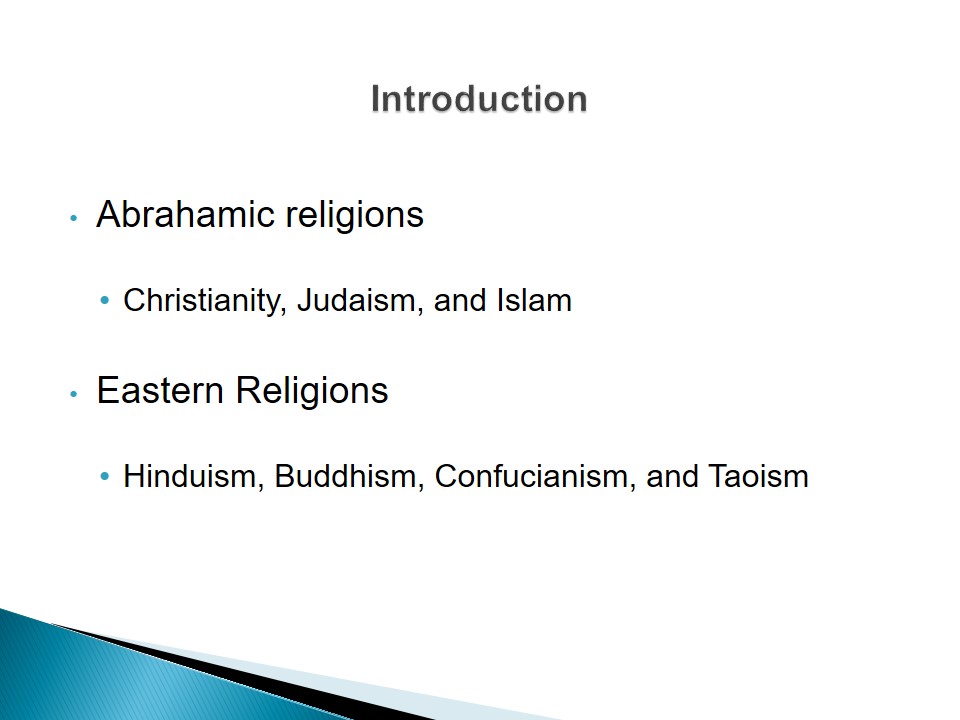
Belief System
- Eastern religions:
- Monism;
- Sentient beings have value;
- Abrahamic religions:
- Dualism;
- Humans and nature are different.
Eastern religions believe in monism. This implies that there is only one kind of reality.
In addition, Eastern religions believe that all sentient beings have value. This is due to the fact that they may be reincarnated souls.
On the other hand, Abrahamic religions believe in dualism. This implies that there are two kinds of reality. These are material and non-material realities.
Abrahamic religions have clear distinctions between humans and other components of the natural world (Koslowski, 2001).
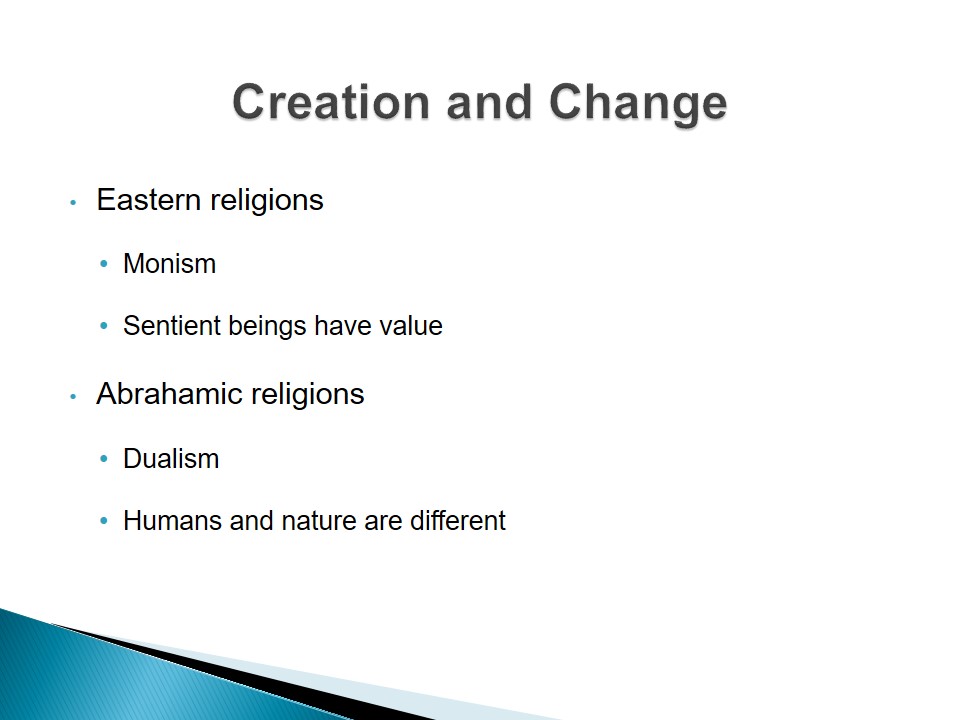
Divine Nature
- Eastern religions:
- The ‘Divine’ is part of creation.
- Abrahamic religions:
- The ‘Divine’ is different from creation.
Eastern religions believe that the ‘Divine’ is part of creation. It is impossible to separate the ‘Divine’ from creation.
Abrahamic religions believe that the ‘Divine’ is different from creation. These religions refer to the ‘Divine’ as the ‘Father’ of the universe.
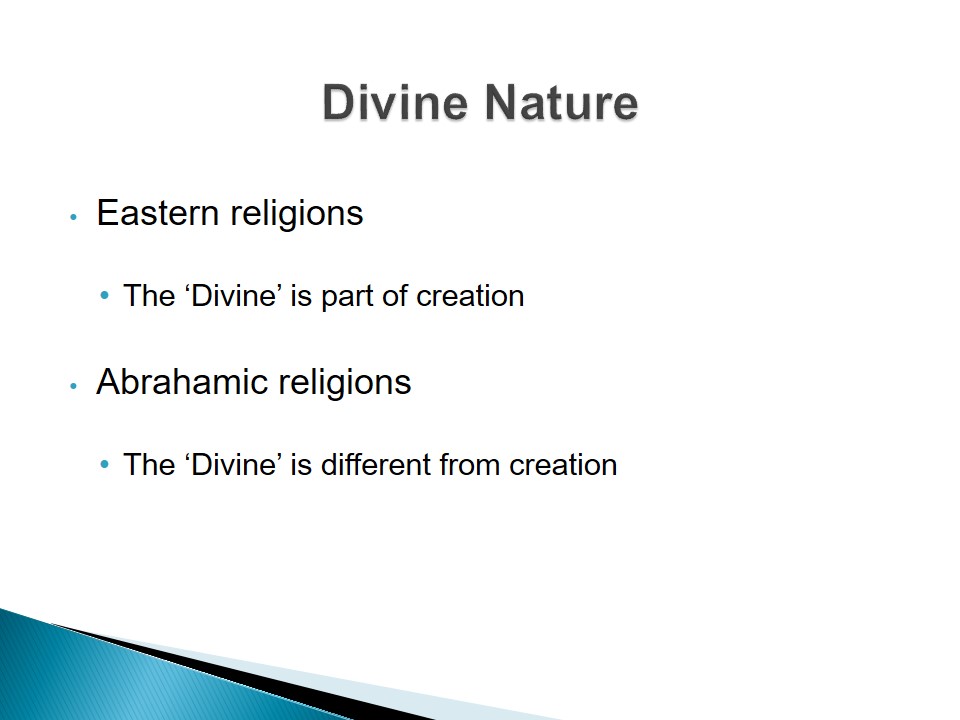
Creation and Change
- Eastern religions:
- Change is part of creation;
- Karma leads to forensic continuity;
- Abrahamic religions:
- Change leads to degradation and disintegration;
- Rewards or punishments come after death.
Eastern religions believe that change is an integral part of creation. Therefore, it does not necessary lead to disintegration.
In addition, Eastern religions believe that Karma leads to forensic continuity. Therefore, people get what they deserve.
On the other hand, Abrahamic religions believe that change leads to degradation and disintegration. They believe that perfect things cannot change. God is perfect. Therefore, He cannot change.
Abrahamic religions also believe that people get rewards or punishments for their actions when they die. Therefore, the physical world is not an arena that will enable people to achieve their moral destiny.
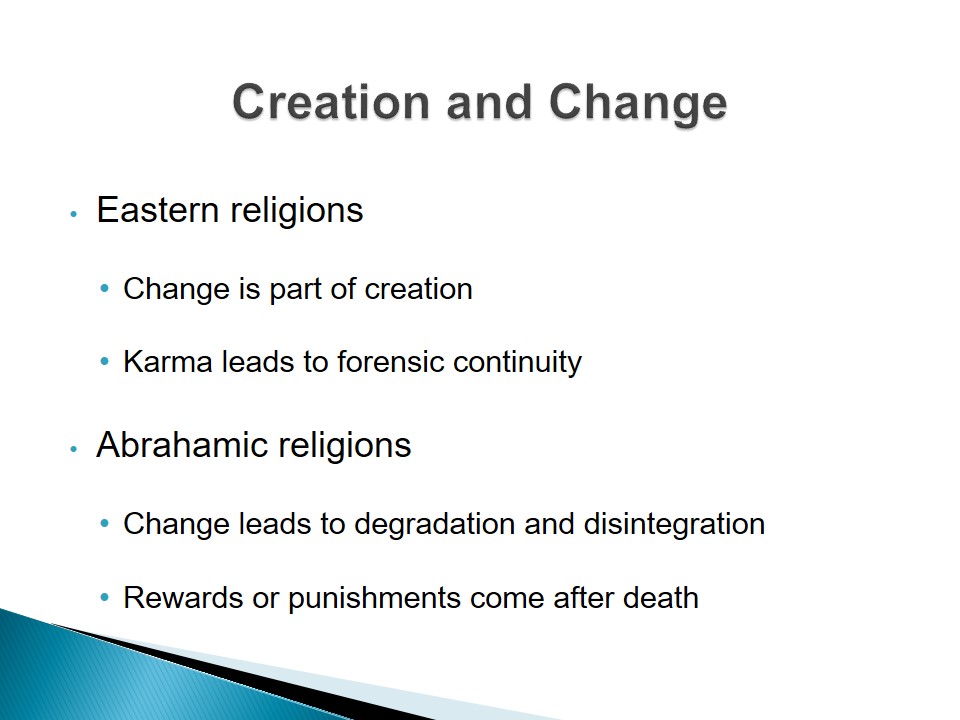
Enlightenment
- Eastern religions:
- Source of enlightenment is from within;
- Several paths to enlightenment;
- Abrahamic religions:
- Religious leaders are the source of enlightenment;
- Spiritual practice is the source of enlightenment.
Eastern religions believe that the source of enlightenment is from within an individual.
In addition, Eastern religions believe that there are several sources of enlightenment. Spiritual practice helps in calming the mind. This enables individuals to get enlightenment and liberation.
On the other hand, Abrahamic religions believe that religious leaders are the main source of enlightenment. Religious leaders help in transmitting God’s word to other people.
Abrahamic religions give more emphasis to spiritual practice. This enables people to develop and maintain a personal relationship with God.
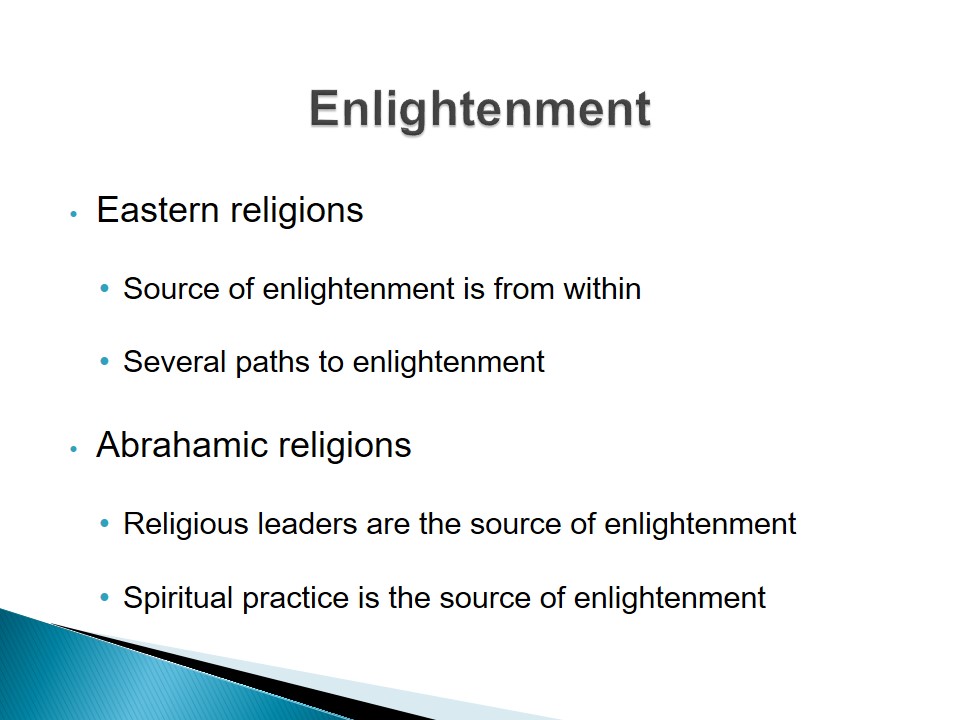
Life and Death
- Eastern religions:
- Reincarnation;
- Afterlife releases people from ignorance;
- Abrahamic religions:
- People live once;
- Afterlife releases the body.
Reincarnation is one of the major beliefs of Eastern religions. Karma rewards or punishes people in their next reincarnation. This belief reduces the worry on injustices or victimizations. The injustices or victimizations are only temporary.
In addition, Eastern religions believe that the major aim of the afterlife is to release people from their ignorance. Afterlife enables people to merge with the ‘Divine.’
On the other hand, Abrahamic religions believe that people live once. Since people live once, sin is a huge problem in these religions. When people die, they cannot get the chance to repent their sins (Ward, 2011).
Abrahamic religions believe that the major aim of death is to release the body from the ‘self.’ The ‘self’ remains in the same state eternally.
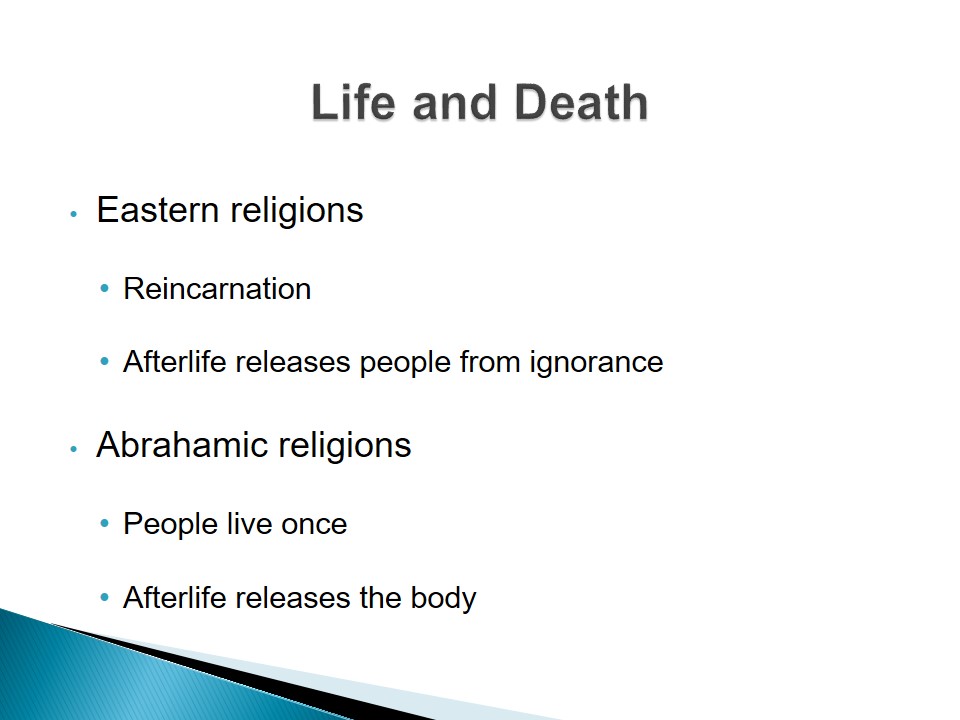
Human Nature
- Eastern religions:
- Human nature is ignorant;
- The body is a moral distraction;
- Abrahamic religions:
- Human nature is sinful;
- The body is a source of temptation and sin.
Eastern religions believe that humans are naturally ignorant. Enlightenment enables people to become better beings.
In addition, Eastern religions believe that the body is a moral distraction. However, the body is not inherently sinful.
On the other hand, Abrahamic religions believe that humans are naturally sinful. Therefore, people become better beings by being able to control their sinful impulses.
Abrahamic religions believe that the body is a source of temptation and sin. Therefore, people must resist their bodily impulses to sin (Browning, Green & Witte, 2006).
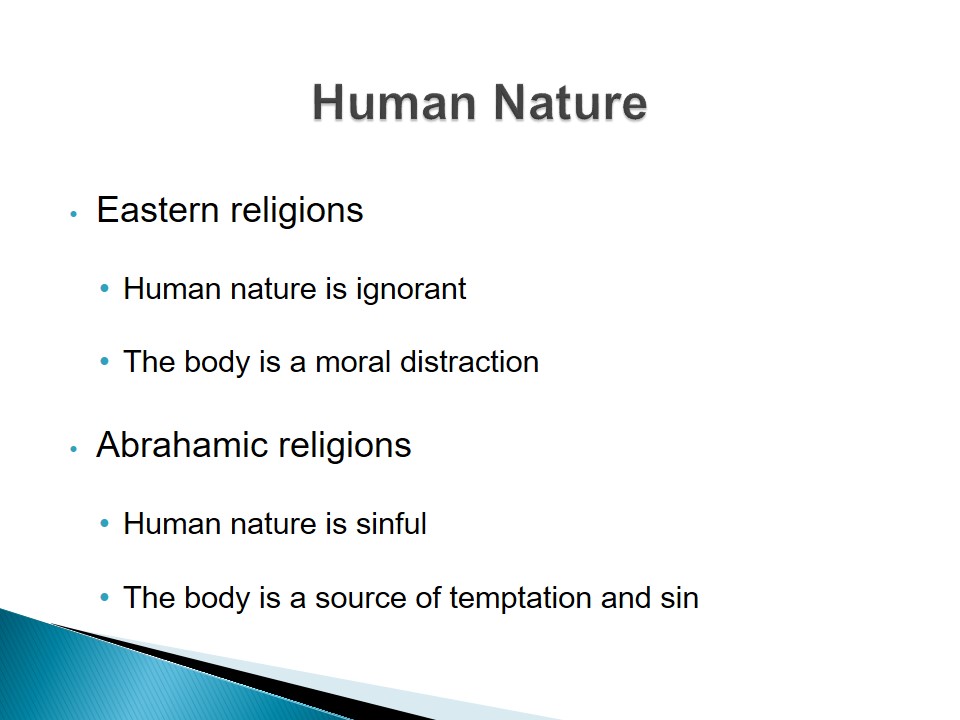
Conclusion
- Eastern religions.
- Life is eternal.
- Abrahamic religions.
- There is a ‘beginning’ and an ‘end’.
Eastern religions believe that life is eternal. Therefore, people must strive to overcome the endless cycle of rebirth. Ignorance is the major factor restricts the enlightenment of people. Enlightenment enables people to have a clear picture of reality.
On the other hand, Abrahamic religions believe that there is a ‘beginning’ and an ‘end.’ God created the world. Therefore, He would one day ‘end’ the world miraculously.
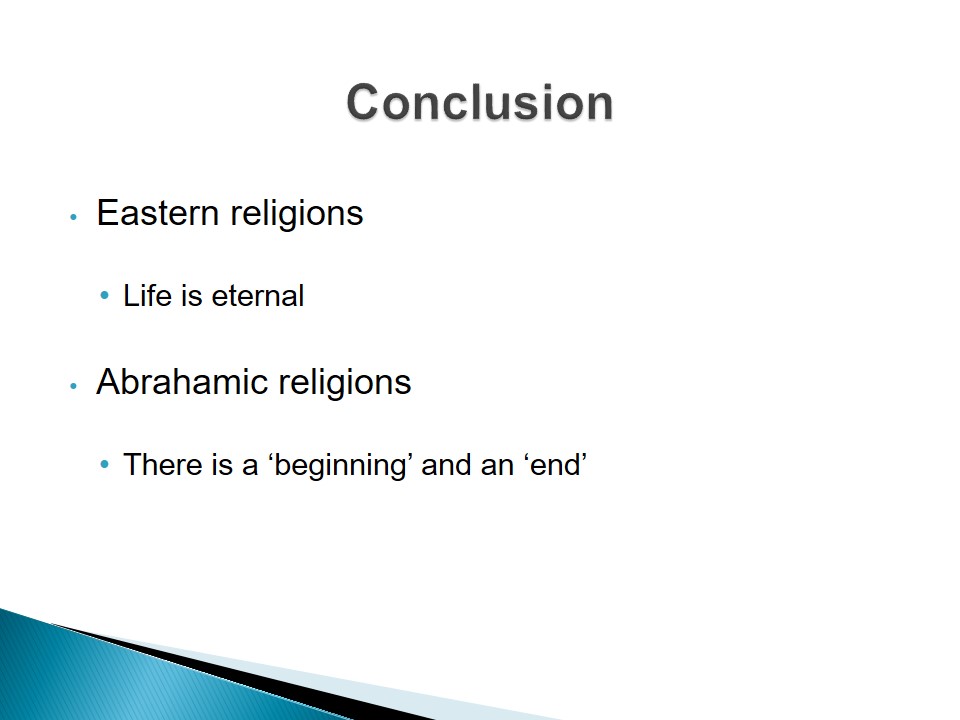
References
Browning, D.S., Green, M.C. & Witte, J. (2006). Sex, marriage, and family in world religions. New York: Columbia University Press.
Koslowski, P. (2001). The origin and the overcoming of evil and suffering in the world religions. London: Springer.
Ward, K. (2011). Is religion dangerous? Oxford: Lion Books.